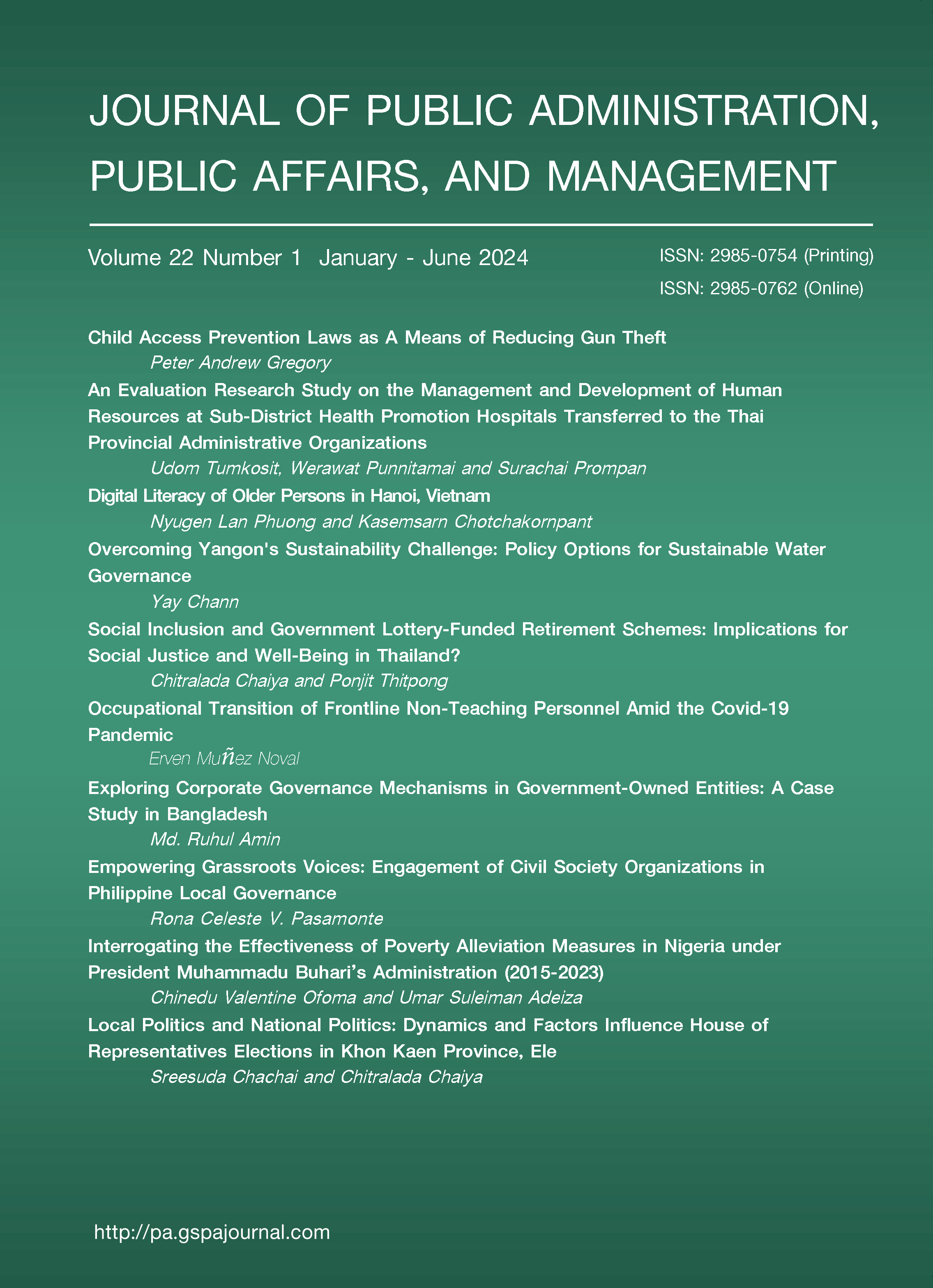Occupation Transition of Frontline Non-Teaching Personnel Amid the Covid-19 Pandemic
Keywords:
Occupational Transition, Covid-19 Pandemic, Frontline Processes, Non-Teaching Personnel, Online Processes, Pandemic Work ExperienceAbstract
The COVID-19 pandemic has proved that the environment surrounding higher education institutions (HEI) is changing rapidly, prompting for implementation of new policies and processes to address fast-changing stakeholder needs. This study explored the transition to online front-line processes in HEI during the pandemic and the experiences of non-teaching personnel with new work arrangements. Findings revealed the implementation of online enrollment, admission, examination, hiring, payment, and request processes during the pandemic. Two key themes emerged from pandemic work experiences; (1) working in the pandemic era and (2) overcoming pandemic-related challenges. The study identifies the 5Rs of Pandemic Work Experience for personnel: Resiliency, Reinvention, Recalibration, Reformation, and Rationalization. Challenges included transition, limited online resources, stakeholder management, and compliance delays. The knowledge of these online processes and experiences can inform the development of responsive front-line processes, assisting organizations in sustaining relevance in this volatile, uncertain, complex and ambiguous (VUCA) world.
References
Bauer, T., & Erdogan, B. (2010). An Introduction to Organizational Behavior. 11st ed. Boston, MA: FlatWorld Publishing.
Braun, V., & Clarke, V. (2006). Using thematic analysis in psychology. Qualitative Research in Psychology, 3(2), 77-101. http://doi.org/10.1191/1478088706qp063oa
Buckley R. C. (2020). Conservation implications of COVID19: Effects via tourism and extractive industries. Biological Conservation, 247, 108640. http://doi.org/10.1016/j.biocon.2020.108640
Carnevale, J., & Hatak, I. (2020). Employee adjustment and well-being in the era of COVID-19: Implications for human resource management. Elsevier Journal of Business Research, 116, 183–187. http://doi.org/10.1016/j.jbusres.2020.05.037
Cebu Normal University – Information Office. (2022). Cebu Normal University Reframing of Teaching and Learning (CNU-RTL) [Video]. Youtube. Retrieved from https://www.youtube.com/watch?v=Rti7DS1qx48.
Crawford, J., Butler-Henderson, K., Rudolph, J., Malkawi, B., Glowatz, M., Burton, R., et al. (2020). COVID-19: 20 countries’ higher education intra-period digital pedagogy responses. Journal of Applied Teaching and Learning, 3(1), 1-21. http://doi.org/10.37074/jalt.2020.3.1.7
Creswell, J. W. (2013). Research Design: Qualitative, Quantitative, and Mixed Methods Approaches. 4th ed. London: SAGE Publications.
Dayagbil, F. T., Palompon, D. R., Garcia, L. L., & Olvido, M. M. J. (2021). Teaching and learning continuity amid and beyond the pandemic. Frontiers in Education, 6, 678692. http://doi.org/10.3389/feduc.2021.678692.
Denzin, N. K., & Lincoln, Y. S. (2003). The Landscape of Qualitative Research Theories and Issues. Thousand Oaks, CA: SAGE Publications.
Duin, A. H., & Baer, L. L. (2020). ‘Smart change’ for turbulent times: Planning for survival requires speed, flexibility, and shared leadership. Planning in Higher Education, 48(3).
Farnsworth, D., Clark, J. L., Green, K., López, M., Wysocki, A., & Kepner, K. (2020). Diversity in the workplace: Benefits, challenges, and the required managerial tools. EDIS, 2002(2). http://doi.org/10.32473/edis-hr022-2002
International Labour Organization. (2020). ILO Monitor 1st Edition: COVID-19 and the World of Work: Impact and Policy Responses. Retrieved from https://www.ilo.org/media/9996/download.
Jehanzeb, K. & Bashir, N. A. (2013). Training and development program and its benefits to employee and organization: A conceptual study. European Journal of Business and Management, 5(2), 243-252.
Jennings, J., & McDougald, M. (2007). Work-family interface experiences and coping strategies: Implications for entrepreneurship research and practice. Academy of Management Review, 32(3), 747-760. http://doi.org/10.5465/AMR.2007.25275510
Kniffin, K. M., Narayanan, J., Anseel, F., Antonakis, J., Ashford, S. P., Bakker, A. B., et al. (2021). COVID-19 and the workplace: Implications, issues, and insights for future research and action. American Psychologist, 76(1), 63–77. http://doi.org/10.1037/amp0000716
Kolzow, D. (2014). Leading from within: Building organization leadership capacity. International Economic Development Council. Retrieved from https://www.iedconline.org/clientuploads/Downloads/edrp/Leading_from_Within.pdf.
Kuranchie-Mensah, E. B., & Amponsah-Tawiah, K. (2016). Employee motivation and work performance: A comparative study of mining companies in Ghana. Journal of Industrial Engineering and Management, 9(2), 255-309. http://doi.org/10.3926/jiem.1530
Martin, M., & Furiv, U. (2020). COVID-19 tests the resilience of higher education. University World News. Retrieved from https://www.universityworldnews.com/post.php?story=20201211130427131.
McNierney, D. (2004). Case study: One teacher’s odyssey through resistance and fear. TechTrends, 48(5), 64-69. http://doi.org/10.1007/BF02763533
Nichols, H. (2020). The effect of participative management on workplace belonging. ProQuest Dissertation & Theses, 28030333. Retrieved from https://www.proquest.com/docview/2437395139.
Nuevo-Chow, L. (2021). Higher education and strategic leadership during the COVID-19 pandemic: A phenomenological study of deans in the 21st century. ProQuest Dissertations & Theses, 28543953. Retrieved from https://www.proquest.com/dissertations-theses/higher-education-strategic-leadershipduring/docview/2545527020/se-2.
Osborne, S. & Hammoud, M. (2017). Effective employee engagement in the workplace. International Journal of Applied Management and Technology, 16(1), 50-67. http://doi.org/10.5590/IJAMT.2017.16.1.04
Peus, C., Wesche, J., Streicher, B., Braun, S., & Frey, D. (2012). Authentic leadership: An empirical test of its antecedents, consequences, and mediating mechanisms. Journal of Business Ethics, 107, 331-348. http://doi.org/10.1007/s10551-011-1042-3
Sandelowski, M. (2000), Whatever happened to qualitative description? Research in Nursing & Health, 23(4), 334-340. http://doi.org/10.1002/1098-240X(200008)23:4<334::AID-NUR9>3.0.CO;2-G.
Slovick, E. A. (2011). A descriptive qualitative study of instructors' perceptions in transitioning from a traditional classroom to online. ProQuest Dissertations & Theses, 3463511. Retrieved from https://www.proquest.com/openview/a8d1571bdc43de21dc6cab4050c8a0b0/1?pq-origsite=gscholar&cbl=18750.
Teevan, J., Hecht, B., Jaffe, S., Baym, N., Bergmann, R., Brodshy, M., et al. (2021). The new future of work: Research from Microsoft into the pandemic’s impact on work practices. Microsoft. Retrieved from https://www.microsoft.com/en-us/research/publication/the-new-future-of-work-research-from-microsoft-into-the-pandemics-impact-on-work-practices/.
Tria, J. Z. (2020). The COVID-19 pandemic through the lens of education in the Philippines: The new normal. International Journal of Pedagogical Development and Lifelong Learning, 1(1), ep2001. http://doi.org/10.30935/ijpdll/8311.
United Nations. (2020). Policy Brief: COVID-19 and the Need for Action on Mental Health. Retrieved from https://www.un.org/sites/un2.un.org/files/un_policy_brief-covid_and_mental_health_final.pdf.
Wong. E., Ho, K. F., Wong, S. Y., Cheung, A. W., & Yeoh, E. (2020). Workplace safety and coronavirus disease (COVID-19) pandemic: Survey of employees. World Health Organization. http://doi.org/10.2471/BLT.20.255893.
World Economic Forum, & Willis Towers Watson. (2020a). Workforce Principles for the COVID-19 Pandemic: Stakeholder Capitalism in a Time of Crisis. Retrieved from https://www3.weforum.org/docs/WEF_NES_COVID_19_Pandemic_Workforce_Principles_2020.pdf.
World Economic Forum, & Willis Towers Watson. (2020b). Human Capital as an Asset: An Accounting Framework to Reset the Value of Talent in the New World of Work. Retrieved from https://www3.weforum.org/docs/WEF_NES_HR4.0_Accounting_2020.pdf.
Downloads
Published
How to Cite
Issue
Section
License

This work is licensed under a Creative Commons Attribution-NonCommercial-NoDerivatives 4.0 International License.



